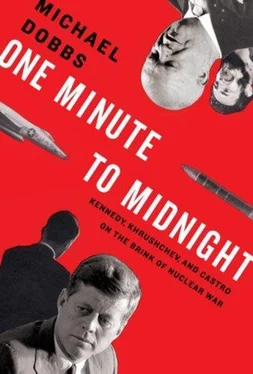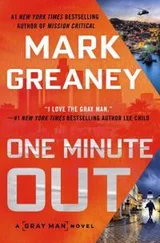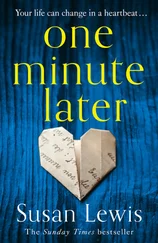An inveterate womanizer, Kennedy told cronies that he was prone to migraines if he did not get a “piece of ass every day.” His libido certainly did not take a break because of the heightened risk of nuclear war. He was still seeing a longtime lover, Mary Pinchot Meyer, the wife of a senior CIA official, Cord Meyer. Artistic, sophisticated, and intelligent, Mary was different from the usual string of presidential girlfriends with nicknames like “Fiddle” and “Faddle.” Kennedy had known her since his boyhood, and often turned to her at moments of high stress and tension. He had invited her at the last minute to a family dinner at the White House on the evening of Monday, October 22, at which Jackie’s sister, Lee Radziwill, and her dress designer, Oleg Cassini, were also present. Mary telephoned Jack in the Oval Office on Saturday afternoon. Unable to reach him immediately because he was tied up in discussions, she left a contact number in Georgetown, where she lived.
Dave Powers makes no mention of Meyer or any other presidential girlfriend in his hagiographic memoir of JFK. By his account, the president spent part of Saturday evening writing a letter of condolence to the widow of Major Anderson. He then went to the White House movie theater to watch one of his favorite actresses, Audrey Hepburn, in Roman Holiday. Before going to bed and turning off the light, he reminded his aide of the schedule for the following morning.
“We’ll be going to the ten o’clock mass at Saint Stephen’s, Dave. We’ll have plenty of hard praying to do, so don’t be late.”
Other officials grabbed what rest they could. At the Pentagon, there was a flurry of late-night excitement about the Grozny, the Soviet ship heading full speed for Cuba. It looked as if the tanker would reach the quarantine line by dawn, shadowed by two American warships. The president would then have to decide whether to stop her or let her go. The choice boiled down to risking a confrontation with Khrushchev before he was really ready or being viewed around the world as weak and vacillating.
George Anderson retired to bed with a cold shortly before 11:00 p.m. after receiving a briefing from Curtis LeMay on everything that had happened in Washington while he was at the Navy-Pitt football game. More than fourteen thousand air reservists had been called up for a possible invasion of Cuba. The Joint Chiefs of Staff had promulgated a revised schedule of reaction times for attacking Cuba:
Air Strikes against SAM sites: two hours.
Full Air Strike: twelve hours.
Invasion: Decision Day plus seven days.
All Forces ashore: Decision Day plus eighteen days.
Even more ominously, the ExComm was planning to announce that any Soviet submarine located within the 500-mile intercept zone would be presumed to be “hostile.” American antisubmarine forces had located two Soviet submarines inside the zone; another two were just outside. The proposed declaration was vaguely worded. Under certain circumstances, it could be interpreted as granting U.S. warships the authority to open fire on the submarines inside the zone, if they presented “a threat.”
In Havana, Sergio Pineda was preparing for another long night. The reporter for the Prensa Latina news agency had been filing dispatches to Latin American newspapers from the Cuban capital. On Saturday evening, he described the call-up of hundreds of young women into health battalions and the appearance of soldiers in steel helmets outside large office buildings “unloading enormous crates of medicine and surgical material.”
“Now anything can happen,” Pineda reported. “There is calm at this time in the city. Everything appears to be sunken into stillness.” As he typed his report, the only sound he could hear was the fluttering of a flute from a radio receiver in a nearby guard post. The music was occasionally interrupted by a radio announcer repeating the words of Antonio Maceo Grajales, one of the heroes of the Cuban war of independence against Spain:
“Whoever attempts to invade Cuba will gather only the dust of its blood-drenched soil, if they do not die in the fight.”
CHAPTER FOURTEEN
“Crate and Return”
2:00 A.M. SUNDAY, OCTOBER 28 (10:00 A.M. MOSCOW)
Events had unfolded very differently from the way Nikita Khrushchev imagined when he sent his armies across the ocean, further than Soviet, or indeed Russian, soldiers had ever ventured before. At the time he made the decision, back in May, it had seemed inspired. He would defend the newest member of the socialist community from American aggression while strengthening the overall military position of the Soviet Union. He had assumed, naively, that it would be possible to hide the nuclear weaponry until he could present the world with a fait accompli. Now, he was faced with a choice he had never anticipated: an American invasion of Cuba and possible nuclear war or a personal humiliation.
The situation was changing hour by hour, sometimes minute by minute, in dangerous, unpredictable ways. Meeting with his Presidium colleagues on Saturday morning, he had announced that an American invasion Cuba was “unlikely” in the near future. Even though he had already concluded that he would have to withdraw the missiles, it was still possible to negotiate, extracting maximum advantage for the Soviet Union from Kennedy’s reluctance to go to war. But a series of unforeseen incidents—including the shooting down of one U-2, the penetration of Soviet airspace by another, and the alarming message from Castro predicting an imminent yanqui attack—had persuaded Khrushchev that time was running out.
He had asked the Soviet leadership to meet with him at a government dacha in the bucolic Moscow countryside. A fairy-tale landscape of billowing birch trees, picture-book villages, and the meandering Moscow River, the area around Novo-Ogaryevo had been the playground of the Russian ruling class for centuries. Tsarist governors of Moscow had carved ornamental gardens out of the thick forest; Stalin came here to escape the Kremlin demons; Khrushchev had his own weekend place nearby, where he liked to relax with his family.
A two-story mansion with a mock neoclassical facade, the Novo-Ogaryevo dacha bore a passing resemblance to the White House in Washington. It had originally been built for Stalin’s putative successor as Soviet prime minister, Georgi Malenkov, who was quickly pushed aside by the more forceful Khrushchev. After Malenkov’s disgrace, the estate was taken away from him and turned into a government guest house. Novo-Ogaryevo would achieve greater fame decades later as the presidential retreat of Mikhail Gorbachev and the site of negotiations that led to the dissolution of the Soviet Union in 1991.
The Presidium members were seated in front of the first secretary along the long, polished oak table. The eighteen attendees included Andrei Gromyko, the foreign minister, and Rodion Malinovsky, the defense minister. Aides hovered in the background, to be summoned and dismissed as needed. As usual, it was Khrushchev’s show. The others were happy to let him talk and talk. “You dragged us into this mess; it is now up to you to find a way out of it” was the unspoken sentiment in the room. Apart from Khrushchev, the only people who contributed very much to the discussion were Gromyko and Anastas Mikoyan.
Lying on the table in front of each Presidium member was a folder with the latest missives from Kennedy and Castro. The White House had released the JFK letter to the press to avoid the long communications delays between Moscow and Washington. Dobrynin’s report on his meeting with Bobby Kennedy had still not reached Moscow when the Presidium session began. But Khrushchev was encouraged by the passage in the Kennedy letter that expressed a willingness to discuss “other armaments” once the Cuban crisis had been resolved. He understood this as “a hint” on the withdrawal of the Jupiters from Turkey.
Читать дальше












